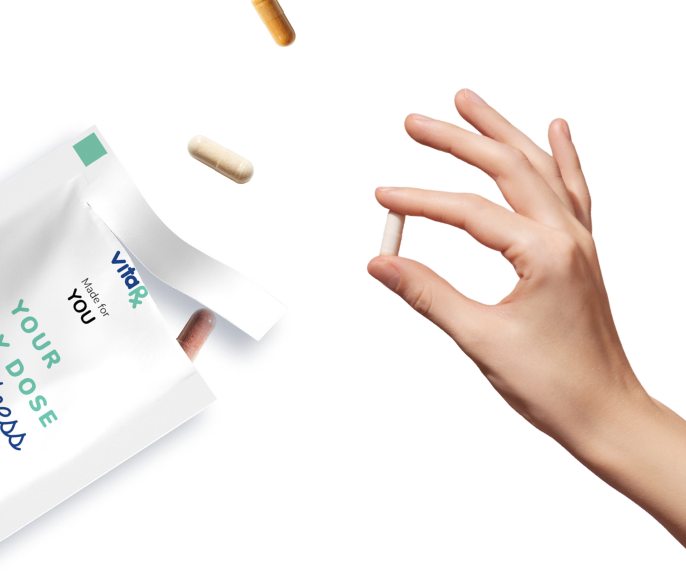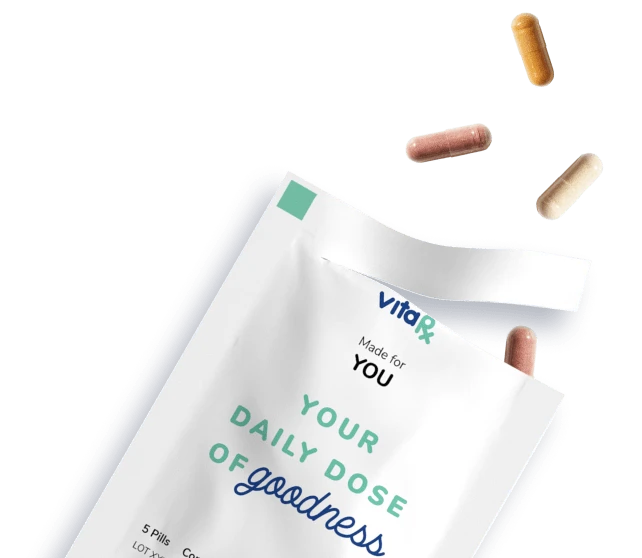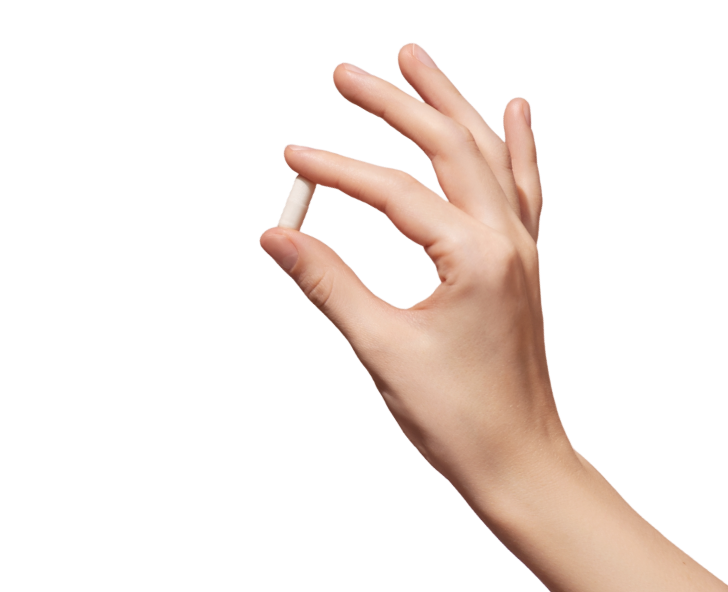Last update: January 20, 2025
7 minute read
Top 10 Blood Circulation Supplements
These 17 supplements have been shown to potentially help blood circulation and vitality. Learn about health benefits, dosages, and more!

By Stephanie Wright, RN, BSN
Edited by Dr. Jacquie Leone, NMD, HN

Have you ever wondered which vitamins and supplements may promote healthy blood flow? If you want to improve your blood circulation and stay healthy, you're on the right track. This post explores 17 supplements that may help your blood flow better. We'll cover natural remedies supported by science and how they help.
Key takeaways
- B-complex vitamins and iron are some of the top supplements for supporting healthy blood flow
- Active lifestyle choices complement the benefits of circulatory health supplements
- Adding other healthy habits may improve blood flow and vitality
What supplements might improve your blood circulation?
It's important to keep your blood flowing well for good health. Good blood circulation helps transport oxygen and nutrients, removes waste, and keeps your organs working.
You've probably heard some common tips, like exercising and staying hydrated, to support circulation. But sometimes, you might need a little extra help.
That's where supplements might be useful. Here's a list of top supplements that might help maintain a healthy circulatory system, along with how they might support better blood flow.
1. B-complex vitamins
Cardiovascular disease is a leading cause of death and disability. Evidence shows high levels of homocysteine can increase your risk for heart disease.
Homocysteine levels rise when you’re low on vitamin B in the blood. So, taking B-complex vitamins, like B12 and folic acid, is crucial for controlling homocysteine levels, which affect blood flow and lower your risk.
2. Vitamin K
Vitamin K2 is super important for keeping your blood flowing smoothly because it helps prevent vascular calcification (or hardening of arteries which is associated with cardiovascular disease). Getting this balance right is crucial to prevent calcium buildup and keep your blood vessels working properly.
3. Vitamin C
Vitamin C helps support your blood vessels. It fights off free radicals known to cause damage to otherwise healthy cells and helps keep your blood vessels strong and healthy. This helps your blood flow better.
VitaRx Tip
Taking Vitamin C supplements is an easy way to make sure you get enough every day and keep your blood vessels in good shape.
4. Vitamin E
Vitamin E is a vital nutrient for vascular health. You can find lots of food sources such as oils, nuts, and seeds. It promotes optimal blood flow by lowering rates of atherosclerosis, a hardening of the blood vessels caused by plaque build up. Studies also suggest an overall reduction in cardiovascular disease deaths in those taking vitamin E supplements.
5. Omega-3 fatty acids
Taking omega-3 supplements could be a smart choice for a healthier circulatory system. Evidence spotlights a direct relationship between omega-3 fatty acids and blood vessel widening. As a result, you see better blood flow to the heart, brain, and other vital organs. The higher rate of flow lowers your risk for vascular disease.
6. Iron
Iron is super important because it helps make hemoglobin, which is needed to carry oxygen in your blood. Making sure you have enough iron is key for good blood flow. It also helps produce nitric oxide, a molecule that's essential for blood vessels to widen. This keeps your circulation healthy. So, getting enough iron is crucial for your overall well-being.
7. L-arginine
L-arginine is a kind of amino acid that your body makes naturally. It helps produce something called nitric oxide, similar to how iron works. Nitric oxide is good because it relaxes and dilates blood vessels, which helps blood flow better.
8. Omega-7 fatty acids
Omega-7 fatty acids, though not as famous as omega-3s, are good for your body. They play a role in keeping your cholesterol levels healthy and help dispense waste. Its anti-inflammatory capabilities help improve circulation, too.
9. CoQ10
CoQ10, short for Coenzyme Q10, is something your body naturally makes. It helps produce energy and works to protect against damage in your blood vessels. The good things it does for blood circulation come from making blood flow better by improving how the inner lining of blood vessels works and protecting them from damage caused by harmful substances.
10. Nattokinase
Nattokinase is an enzyme found in natto, a Japanese fermented soy food. It helps keep your blood circulation healthy by maintaining good platelet levels, which keeps your blood flowing smoothly. Adding nattokinase supplements to your routine may help support your circulatory system’s health.
VitaRx Tip
As we get older, our blood vessels may become less flexible, and that's when L-arginine may become even more important.
More blood circulation tips
Boosting blood circulation health is not just about supplementation; it involves a holistic approach to health. While supplements play a key role, adding other healthy habits may improve blood flow and vitality even more. Here are some easy tips to help you improve how your blood moves through your body.
- Stay active: Regular exercise, especially activities like jogging or dancing, may really boost how well your blood moves around your body.
- Hydrate well: Drinking enough water is super important to keep your blood volume up and help it circulate properly.
- Quit smoking: Smoking is not good for your blood vessels; it makes them narrow and limits blood flow, so it's best to quit.
- Watch your weight: Keeping a healthy weight is good for your heart and blood vessels, preventing extra strain.
- Compression stockings: Wearing compression socks improves blood flow back to your heart by allowing a little pressure to your legs.
- Elevate your legs: Lifting your legs up may help reduce swelling and get blood back to your heart.
- Manage stress: Stress may tighten up your blood vessels, making it harder for blood to flow. Try relaxing activities to keep stress in check.
Advantages and disadvantages of blood circulation supplements
Using supplements to boost blood flow has its benefits, but it's important to think about possible drawbacks. The key is to find the right balance that fits your health needs while making sure it's safe and works well.
Frequently asked questions (FAQ)
Final thoughts
Supplements may help improve blood circulation. When you pair them with making healthy choices in your daily life, it's a powerful way to stay healthy. Just a reminder, before you try any new supplements, it's important to talk to your doctor, especially if you have any health issues. Get started on your journey to better blood circulation today!
Source
- Homocysteine, Vitamins B6 and Folic Acid in Experimental Models of Myocardial Infarction and Heart Failure—How Strong Is That Link?
- Nattokinase: A Promising Alternative in Prevention and Treatment of Cardiovascular Diseases - PMC
- Review: Vitamin K2—a neglected player in cardiovascular health: a narrative review - PMC
- Vitamin C - Health Professional Fact Sheet
- Vitamin E: Where Are We Now in Vascular Diseases? - PMC
- Self-Reported Omega-3 Supplement Use Moderates the Association between Age and Exercising Cerebral Blood Flow Velocity in Older Adults - PMC
- Iron deficiency and cardiovascular disease - PMC
- L-Arginine-Nitric Oxide-Asymmetric Dimethylarginine Pathway and the Coronary Circulation: Translation of Basic Science Results to Clinical Practice
- Dietary Palmitoleic Acid Attenuates Atherosclerosis Progression and Hyperlipidemia in Low‐Density Lipoprotein Receptor‐Deficient Mice
- Ethnomedicinal uses, phytochemistry and dermatological effects of Hippophae rhamnoides L.: A review - ScienceDirect
- The Use of Coenzyme Q10 in Cardiovascular Diseases - PMC
- The Use of Coenzyme Q10 in Cardiovascular Diseases
Author

Stephanie Wright
Stephanie brings over 13 years of diverse nursing experience to the table, having honed her expertise in critical care, mental health, and utilization management. Her journey as a registered nurse across these various healthcare sectors underscores her adaptability and deep commitment to patient care.
Fact checker

Dr. Jacquie Leone
Dr. Leone holds a BA in Psychology, a Doctorate in Naturopathic Medicine, and board certification in holistic nutrition. In addition to practicing medicine, Dr. Leone has developed and currently teaches science and nutrition courses for a nationally accredited institution. She specializes in chronic illness, gastrointestinal dysregulation, inflammatory conditions, and mental health. Her unique approach combines the wisdom of Eastern medicine with the technology and science of Western medicine, offering an integrative approach heavily focused on functional medicine.
At VitaRx, we're not just passionate about our work — we take immense pride in it. Our dedicated team of writers diligently follows strict editorial standards, ensuring that every piece of content we publish is accurate, current, and highly valuable. We don't just strive for quality; we aim for excellence.
Related posts
While you're at it, here are some other relevant articles you might be interested in.

Get your personalized vitamin recommendations in less than
5 minutes.
Get your personalized vitamin recommendations in less than
5 minutes.







